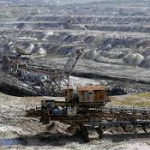 Serbia’s Zijin Mining, a wholly owned subsidiary of Zijin and backed by China, has received permission from the Serbian government to begin mining operations at the Cukaru Peki copper and gold mine, part of the Timok project, in the eastern part of the country.
Serbia’s Zijin Mining, a wholly owned subsidiary of Zijin and backed by China, has received permission from the Serbian government to begin mining operations at the Cukaru Peki copper and gold mine, part of the Timok project, in the eastern part of the country.
The country’s mining ministry reported that Serbia will become Europe’s second-largest copper producer once the mine begins operations.
Cukaru Peki was originally scheduled to begin production in the summer of 2021, with an initial average copper production of 91,000 tons per year and an annual gold production of about 200,000 ounces.
The mine is now expected to begin production in the fourth quarter of this year, gradually increasing production to a peak of 135,000 tons of copper per year.
The Serbian government expects the country’s booming mining sector to begin generating between 4% and 5% of its total GDP in less than 10 years, a significant increase from its current 2%.
Zijin’s local subsidiary currently operates the country’s only copper complex – RTB Bor. The company had to temporarily stop work at the mine in April due to an alleged violation of the country’s environmental regulations.
The unit was ordered to complete a wastewater treatment plant at the mine as a priority to avoid polluting the Pek River, a tributary of the Danube.
Serbia’s Zijin Copper has pledged to invest $408 million this year, up from $360 million in 2020, to overhaul and expand its four mines and one smelter.
The plan also includes improving environmental protection in the heavily polluted Bor region in eastern Serbia.
China has spent billions of euros in Serbia, mostly in the form of soft loans to finance highway and energy projects. The investments are part of Beijing’s so-called belt and road initiative to open up new foreign trade links for local companies.
.gif) Loading
Loading

